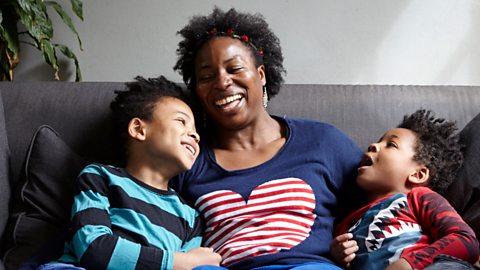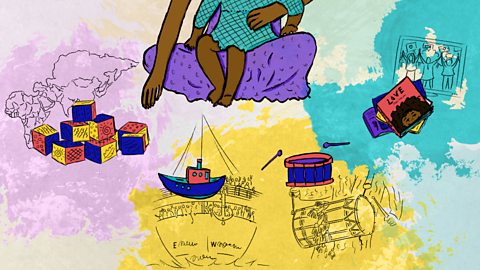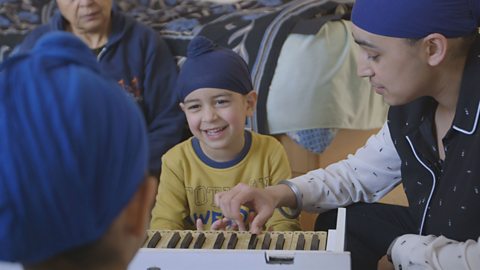Ghazal Abdeh, 29, lives with her husband in Manchester and is mum to Nabeel, 4 and Mayaan, 2. Here, she shares her experiences of raising her children with both British and Muslim values.
I was brought up in the Emirates and moved to the UK when I was 13. My husband and I both describe ourselves as ŌĆśthird culture kidsŌĆÖ because weŌĆÖre a bit of everything and from everywhere.
IŌĆÖm of Syrian origin but IŌĆÖve never lived there, and my husband is originally Palestinian but was born and brought up here. Our cultural inheritance plays a big part in how we bring up our children, with both the values of being British and Muslim.
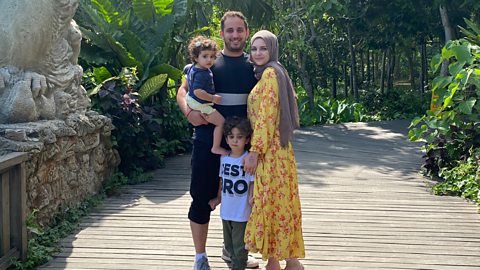
Learning about different cultures
The children already understand that people come from different backgrounds, and weŌĆÖre teaching them to be proud of who they are.
I use movies, TV shows and songs so my kids can learn about different cultures. And one way I teach them about Islam is through different celebrations.
All kids love Christmas, Easter and Halloween, and ours are no exception. We celebrate them, but we also teach the kids that they arenŌĆÖt our celebrations. Instead, things like Ramadan and Eid are Islamic celebrations.
ItŌĆÖs much harder to make them a big deal because Christmas and Easter are so big and commercialised in the UK. I have to go all out with the decorations and make sure my family takes time off because itŌĆÖs important for the kids.
I explain to them why we celebrate and I also explain the rituals we do, like going to the mosque to pray on the first day of Eid.
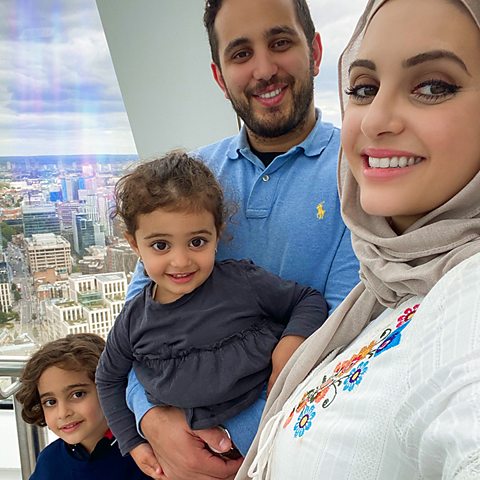
Raising bilingual children
WeŌĆÖre teaching both our children to speak Arabic and English. I speak French too, but itŌĆÖs hard enough teaching them a second language, let alone a third!
The kids find it easier to talk in English. ItŌĆÖs the language they hear at school and on their favourite TV shows.
I try and choose an Arabic voiceover when possible to help them learn. My husband is strict and will only answer them if they speak in Arabic. This is important because if you donŌĆÖt pick up a language at a young age, itŌĆÖs much harder to learn.
My daughter has just started speaking, but sheŌĆÖs learning in a completely different way to my son. He picked up straight away that a word can be said in two different ways depending on whether youŌĆÖre speaking English or Arabic. My daughter thinks sheŌĆÖs saying it wrong when we correct her.
Learning about Islam
My son is really interested in Islam. We pray five times a day which teaches us to be grateful for everything we are given and to remember God.
Sometimes my son will join in and he asks lots of questions like, ŌĆśWhy do we fast?ŌĆÖ and ŌĆÖWhy do we pray?ŌĆÖ.
We teach him that God is all-loving and that there are things to learn through our actions. For example, we fast every Ramadan because we need to feel how people who are poorer feel and what itŌĆÖs like to not have food.
IŌĆÖve also told him about zakat, where a percentage of our earnings goes to charity and that our religion encourages us to look after other people in the community.
At NabeelŌĆÖs last parentsŌĆÖ evening, his teacher told us she was really proud of him because he was showing her how we pray and teaching her Arabic words.

She said they have a lot of kids from different backgrounds, and you tend to find kids usually hide that about themselves. They donŌĆÖt share it with their teacher or friends and donŌĆÖt like saying words in a different language in front of their class.
WeŌĆÖve taught Nabeel to celebrate these things.
Dealing with prejudice
The fact I wear a headscarf means I experience microaggressions daily. I feel there is a stereotype about Muslim women being submissive, and people feel like they can disrespect them or talk to them in any way they want.
They think: ŌĆśSheŌĆÖs not going to answer back. SheŌĆÖs weak, and sheŌĆÖs vulnerable.ŌĆÖ
IŌĆÖm quite feisty, so if people look at me in a certain way, IŌĆÖll ask whatŌĆÖs wrong. IŌĆÖll confront it.
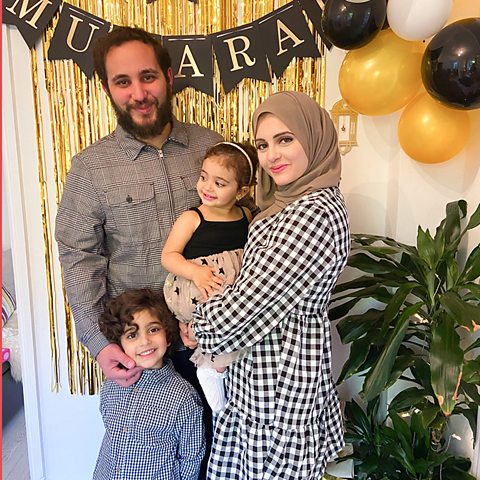
When my son was two, we were on a flight to Turkey and a woman refused to sit next to me. IŌĆÖve also had a situation where someone gave my child dirty looks just because they were with me.
My mother-in-law has had people openly shouting at her in a supermarket and telling her to go back to her own country because she was speaking in Arabic. Her reaction was different to how mine would be because she wasn't brought up here. If someone said that to me, IŌĆÖd give it back to them! ItŌĆÖs 100% ignorance.
IŌĆÖve had to grow with that and realise that itŌĆÖs not because of me, itŌĆÖs because of them. TheyŌĆÖve got issues and are ignorant.
Teaching confidence and tolerance
As a parent, IŌĆÖve made sure we live in a place where my children are much less likely to be exposed to bullying or ignorant comments. And I equip them with confidence in themselves, so even if this were to happen to them, theyŌĆÖd never think there was a part of them they should be ashamed of.
My husband experienced racism when he was at school from a teacher, and I can see he still carries it with him today.
These are the things IŌĆÖm more wary of, and as a parent I have to be much more involved in their lives and keep my eye out for it happening.
Our children are British Muslims and along with learning about both British and Muslim values, I want them to be kind human beings who are understanding and empathetic towards others and happy with their own lives.
If that happens, IŌĆÖll have done the best job I could.
What I want people to know:
1. If you donŌĆÖt understand something then ask
IŌĆÖve been stopped and asked questions about why I wear a headscarf. Do it in a nice way and IŌĆÖm more than happy to explain. I donŌĆÖt like it when people make assumptions based on ignorance or when itŌĆÖs asked aggressively.
2. British and Muslim values go together
Our values 100% go together with British values. IŌĆÖm raising my kids with the values of being British but at the same time teaching them the values that come from their religion.
3. Every mum faces challenges
No matter what race or culture youŌĆÖre from, weŌĆÖre all trying to raise our kids the best we can. And we all face the same challenges, like juggling work and making sure our children are happy.


